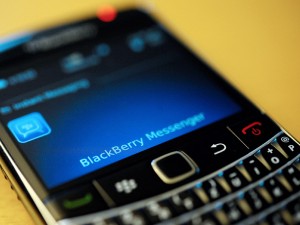Smartphones put writing on the wall for paid texts
Singapore – Text messaging, the simple telecoms service that turned into a global phenomenon, is under threat from free smartphone services and operators need to find alternative revenue streams, analysts say.
The short message service, or SMS, started as a way to use spare telecoms capacity but has become a key cash generator for operators, while offering users a cheap way to keep in touch with friends and family and avoid the expense of voice calls.
But the surge in Internet-enabled smartphones in recent years has led to the rise of free voice, video and text messaging applications that are threatening to send SMS into oblivion.
According to technology research firm Ovum, SMS contributed about 57 percent of non-voice revenues for telecom companies globally in 2009 but this is projected to fall to 47 percent this year.
Ovum estimates the rise of alternative messaging services has slashed $8.7 billion from the revenues of telecom operators worldwide in 2010 and $13.9 billion in 2011.
“SMS in the next few years will contribute less and less to non-voice revenue for operators,” said Neha Dharia, a consumer telecoms analyst at Ovum.
“Consumers now have the ability to send text messaging through a variety of ways, such as IM (instant messaging), messaging apps, social networks and so on,” she told AFP.
“These products offer greater features and are competitively priced or even free. SMS is a more expensive option in certain markets and the interface is not as user friendly or intuitive as other messaging products in the market.”
The surge in mobile Internet, driven by the explosion in smartphones and tablet computers, was a major topic at the four-day CommunicAsia fair that ended in Singapore on Friday.
Mobile devices are on track to replace conventional computers as the primary means to connect to the Internet, speakers said, and offer access to the likes of Yahoo!, Google and Facebook, among others, with their own instant messaging features.
At the same time applications such as WhatsApp, Viber, Tango and the iPhone’s Facetime offer free voice and video calls and message services when there is wireless connection.
The changeover has already begun.
Data from Singapore’s Infocomm Development Authority showed users in the tech-savvy city-state sent and received a record 2.46 billion SMSs in September 2011 but the number has since been falling and was down to 2.21 billion in March.
“I use it (SMS) a lot less these days,” said Joscelyn Tan, 35, a corporate marketing specialist for an electronics company in the city-state.
“WhatsApp is so convenient. Plus it’s free and a lot more fun with all the ’emoticons’. I used to have to pay for extra SMS, not anymore,” she added.
But it remains a slow process in some of Asia’s biggest telecommunications markets.
In a Pew Research Centre survey of mobile phone users in 21 countries last year, Indonesians reported the heaviest SMS usage, with 96 percent saying they regularly send texts.
The vast majority of Indonesia’s 240 million people cannot afford smartphones and buy old-model Nokia handsets, which can cost as little as $15, making text messaging a primary means of communications.
But even so the country is also one of the world’s biggest BlackBerry markets – in large part because of its wildly popular instant messaging services.
With a mobile phone penetration rate of nearly one handset for every Filipino, SMS messaging has become an important part of Philippine culture and politics.
Official data shows an average of 15 text messages – a mix of jokes, chain messages, political or showbiz rumours, uplifting quotes and invitations – are sent each day by each user, making Filipinos among the world’s biggest users.
As well as being harnessed to organise “people power” political protests, text messaging also allows Filipinos to communicate cheaply with relatives who are part of the nine million-strong work force abroad.
Maurie Dobbin, managing director at TeleResources Engineering, said SMS is likely to decline as people increasingly switch to smartphones.
“When the smartphone penetration in these Asian markets comes up… we will see a dramatic impact on SMS traffic,” Dobbin told AFP on the sidelines of CommunicAsia.
Smartphones represented only 12 percent of all mobile phones in use globally last year, but accounted for 82 percent of data traffic, said Dobbin, adding that telecom operators needed to adjust as revenues from SMS decline.
“They do need to be more than a dumb pipe,” Dobbin said. “They need to be providing value to their customers… their business model needs to change and they need to introduce new products into that.”
